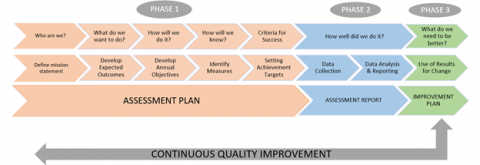Administrative Unit Assessment
At UL Lafayette, assessment consists of an assessment plan (mission, outcomes, measures, and targets), and an assessment report (findings and action plans). Assessment plans are created at the start of the assessment cycle. The Office of Planning and Academic Initiatives reviews the plans, and feedback is provided to the entities. Units then collect data identified in the measures throughout the assessment cycle year. After the year's completion units will compose an assessment report. The report asks units to analyze the data and draw conclusions from it. Strengths, weaknesses, and highlights are described. The report will also ask units to develop an action plan, which should be reflected directly or indirectly in the objectives, measures, and targets of the assessment plan for the following assessment cycle.
Assessment Cycle/Phases
Phase 1: Develop an ASSESSMENT PLAN
Step 1: Define/Refine the Mission Statement (Who are we?)
Step 2: Develop Expected Outcomes (What do we want to do?)
Step 3: Develop Annual Objectives (How will we do it?)
Step 4: Identify Measures (How will we know?)
Step 5: Set Achievement Targets (Criteria for success?)
Phase 2: Develop an ASSESSMENT REPORT (How well did we do?)
Step 6: Data Collection
Step 7: Data Analysis and Reporting
Phase 3: Develop an IMPROVEMENT PLAN (What do we need to do better?)
Step 8: Use of Results for Improvements
The Office of Planning and Academic Initiatives can assist:
- Assists divisions with planning efforts to ensure that each unit has well-articulated outcomes in the form of assessment plans.
- Helps units utilize assessment results from planning efforts to improve performance and refine expected outcomes, measures, and targets.
- Supports continuous improvement through data-informed decision making
- Supports units with alignment of their goals to strategic plans and defined outcomes to regulatory requirements such as SACSCOC and programmatic accreditation

